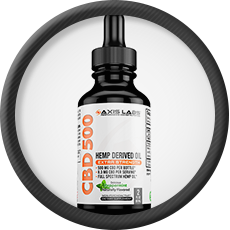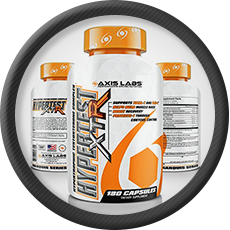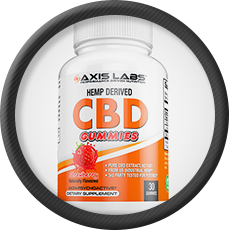Your Cart is Empty
Does CBD Affect Your Testosterone Levels?
When it comes to finding products to support your health, wellness, and lifestyle, finding one source for all these products can be challenging. But here at Axis Labs, we offer just that. While we’re perhaps best known for a line of leading sports nutrition supplements, we’re also excited to offer some of the finest CBD products available. As an innovator in not one but two different fields, we’re always looking for ways our customers can use our products to more effectively enhance their health.
With the recent explosion in popularity of hemp and CBD products, we have received hundreds of questions from our customers about how they can use their CBD products in tandem with the sports and health products we offer. In particular, our customers have asked us about the connection between CBD and testosterone. After all, there's some evidence to suggest that marijuana may impact an individual's testosterone levels.
But can the same be said for the other cannabis compound, CBD? As ardent supporters of the mantra "knowledge is power," we want to better inform our customers so that they can use our products in a way that is meaningful for them. As such, let's take a look at some of the research and studies behind these two naturally occurring chemicals.

Before we get too far into our research, let’s take a minute to familiarize ourselves with some of the terms and ideas we will be discussing. While those who are familiar with the bodybuilding and health and fitness worlds are already likely aware of what testosterone is and how it affects their performance, they may not understand the role of CBD in their health. Conversely, those who have put time into understanding cannabis and its effects may not recognize the benefits that testosterone can offer them.
What is CBD?

CBD is just the abbreviation for cannabidiol. It’s one of many cannabinoid compounds found in cannabis plants like hemp. Because of its chemical makeup and repository of nutrients and vitamins, CBD has the potential to be used in a variety of ways to enhance your health. While the FDA has no official guidelines or regulations about the use of CBD, hundreds of studies have found promising evidence that it can be used for purposes like:
Another often discussed cannabis compound is THC, or tetrahydrocannabinol. While they both are derived from cannabis plants, they are not the same compound. THC is the psychoactive component and marijuana that leaves you feeling "high." CBD, on the other hand, actually serves to counteract the psychoactive effects, which can help you feel centered and laid-back.
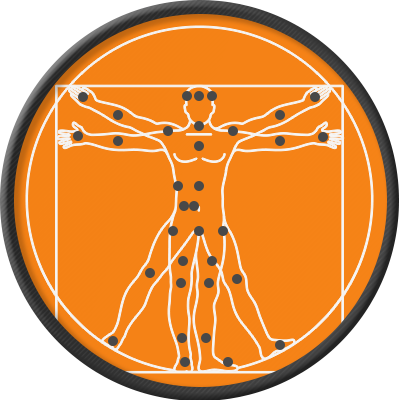 Your Endocannabinoid System
Your Endocannabinoid System
Surprisingly, your body is naturally ready to make use of cannabinoids. That's because there's a network of receptors within your body that make use of these compounds. This is called the ECS, or the endogenous cannabinoid system. This system is made up of primarily to cannabinoid receptors, CB1 and CB2. The CB1 receptor is primarily found in your nervous system, organs, and connective tissues. CB2 can be found in the systems related to your immune system.
The ECS plays a pivotal part in human health, largely because it intersects with many of the systems in your body. You'll find endocannabinoid receptors in places like organs, your brain, hormonal glands, tissues, muscles, and even cells. Essentially, the ECS helps your body maintain homeostasis. It's for this reason that many people turn to CBD as a way to manage pain, recover from injury, and achieve a greater subjective sense of wellness.
What is Testosterone?

Testosterone is a hormone that is naturally produced in the primary sex organs of the human body. Typically, testosterone is first produced during puberty and continues throughout your life, eventually slowing after the age of 30 or so. This hormone plays a role in many of the body's functions. Primarily, it is related to your sex drive and the production of sperm in men. It also plays a notable role in the development, growth, and maintenance of both bone and muscle. In other capacities, testosterone also plays a part in fat storage in the body and the production of blood cells. The production and distribution of testosterone in your body is controlled by your brain and pituitary gland.
Your body will naturally begin to slow its production of testosterone as you age, however low testosterone levels can impact your overall health. In fact, it can impact your body in a variety of surprising ways, including:
- Changes in mood
- Recurring feelings of fatigue
- Increased weight gain
- Thinning body hair
- Lessened muscle mass and more delicate bones
- And more
So now that we know how these two compounds interact with your body, we can begin to understand how they might interact with each other. Studies have found that when you introduce cannabinoids to your system, they bind with your body's natural cannabinoid receptors. When the CB1 and CB2 receptors interact with cannabinoids, your body suppresses its production of testosterone. While this might sound bad, you have to remember that CBD does not bind to these receptors. In fact, THC is the only cannabinoid that binds to CB receptors.
Your Endocannabinoid System and Testosterone
The ECS can play a role in your body's ability to produce testosterone. That's because your ECS and your hypothalamic-pituitary-adrenal axis interact with each other. Your HPA is the part of your body responsible for creating testosterone. In order for your body to produce testosterone, signals are to be sent from the brain and hypothalamus. From there, your pituitary gland activates the luteinizing hormone which leads to the production of testosterone from the Leydig cells.
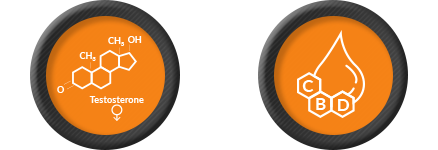
CBD and Testosterone
Within sperm cells, the pituitary gland, and your Leydig cells, you'll find cannabinoid receptors that can have an impact on your testosterone production. So if some cannabinoids are bad for testosterone production, what does CBD do? There's a body of evidence to suggest that CBD could play a role in balancing your testosterone levels. That's because CBD has the potential to slow down the production of testosterone, while simultaneously limiting the breakdown of testosterone in the liver. Similarly, it does not lower the levels of circulating serum testosterone in the blood.
Indeed, CBD can actually help stimulate the production of testosterone and other ways. This cannabis compound has shown promise in limiting the production of prolactin and cortisolhormones, two neurotransmitters that can slow your level of production of testosterone. That's because both these hormones are produced in your body in response to stress. Whether it's physical or mental, lower testosterone levels are a natural response to stress.
 After an intense workout, your body needs time to recover. That’s because cortisol is also released after exercise. A workout is a form of physical stress that engages the same "fight or flight" response as emotional stress. Heightened levels of cortisol can have an impact on your physical health over time. Your tissues will begin to break down, proteins will not synthesize as quickly, and your body will not properly convert protein to glucose which inhibits the development of muscles and leads to increased body fat. By limiting the amount of stress in your life, you can help your body naturally produce more testosterone. From an emotional standpoint, CBD is known for its anxiolytic effects. That means that some individuals may find that they feel more relaxed after using a CBD product than before. Numerous studies have found that CBD is an effective addition to treatment plans for both social and general anxiety disorders. By limiting the amount of emotional stress you feel, you can help your body produce more testosterone.
After an intense workout, your body needs time to recover. That’s because cortisol is also released after exercise. A workout is a form of physical stress that engages the same "fight or flight" response as emotional stress. Heightened levels of cortisol can have an impact on your physical health over time. Your tissues will begin to break down, proteins will not synthesize as quickly, and your body will not properly convert protein to glucose which inhibits the development of muscles and leads to increased body fat. By limiting the amount of stress in your life, you can help your body naturally produce more testosterone. From an emotional standpoint, CBD is known for its anxiolytic effects. That means that some individuals may find that they feel more relaxed after using a CBD product than before. Numerous studies have found that CBD is an effective addition to treatment plans for both social and general anxiety disorders. By limiting the amount of emotional stress you feel, you can help your body produce more testosterone.
It’s no wonder then that many people are turning to cannabis products like CBD for their post-workout recovery needs. CBD is praised for its natural anti-inflammatory effects. This is because CBD is packed full of essential fatty acids. Omega's 3 and 6 offer you a variety of post-workout benefits, like counteracting inflammation, limiting joint pain, and helping to keep your arteries smooth and clean. This means you can recover from your workouts more quickly, and limit the amount of stress you place on your body, thereby improving your testosterone production.
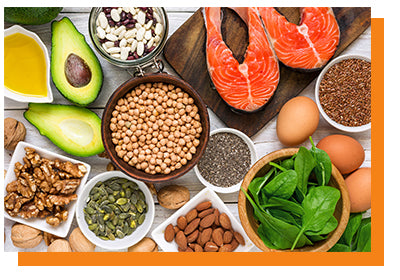
As an added benefit, the essential fatty acids found in hemp extracts like CBD oil, have been shown to also help increase testosterone production. A year-long study in Spain conducted in 2010 looked at testosterone levels in the intake of certain fats. The study found a positive association between the ingestion of polyunsaturated fats like omega-3 and 6 and luteinizing hormone concentrations. Ultimately, the study found that subjects who increase their intake of essential fatty acids saw increased and improved testicular function, which likely helped improve their levels of production of testosterone.
Should You Use CBD to Support Your Testosterone Levels?
So, what should we take away from all of this? First, it’s important to recognize that cannabis compounds of all kinds are going to impact your testosterone levels, primarily because it can affect the overall production of the hormone.
Second, it's important to remember that research is still being invested in the CBD and testosterone relationship. Most evidence now suggests that the use of CBD in your day-to-day activities will very likely not lead to an increase of testosterone in your body. However, it is suspected that the use of CBD does not have an adverse effect on your testosterone levels either. In fact, some would argue that the benefits that CBD has to offer may have a net positive benefit on your overall testosterone levels.

To naturally improve your testosterone levels, most specialists recommend that you concentrate on prioritizing sleep, cultivating a healthy and balanced diet, shed excess weight, exercise regularly, find ways to reduce stress, and make use of testosterone boosting supplements if need be. Of course, CBD can be utilized in all of these measures and more. Therefore, when paired with all of the above, plus, the use of a premium quality testosterone boosting supplement, you might find that CBD oil plays a positive role in managing or improving your testosterone levels.

Axis Labs offers premium quality CBD and testosterone boosting supplements. Lab tested for purity and potency and gym proven by bodybuilders across the country, our products can help you meet your health and fitness goals faster. Browse our complete collection of both testosterone supplements and CBD-based products and order yours today. For more information, we invite you to visit our blogs where we regularly post new articles and updates about both of these topics.






 Your Endocannabinoid System
Your Endocannabinoid System